Who is this that is eating, suffering, sitting and enjoying the meditation?
--- Chan 5 With Guo Yuan Fashi. Yogyakarta, Indonesia, 25 – 29 October 2009
First of all, I understand that, as always the case, it is not easy to have the opportunity to participate in the retreat and therefore I feel grateful.
I am grateful to be able to attend this retreat, to meet fellow practitioners from yogya sitting group and to meet Guo Yuan Fashi, Chang Tuo Fashi and Brother Agus again.
When I first see Guo Yuan Fashi as he entered the meditation hall, I was slightly moved by sadness, realizing that seven years have passed like a blink since I met him in New York. I realized that I am getting older but not really any wiser. Nevertheless, when he started giving his first instruction, the feeling of sadness was soon forgotten.
I was very curious when Guo Yuan Fashi taught about opening the eyes slightly during the meditation. I normally close my eyes during sitting, eventhough I have been aware about the approach of opening eyes slightly that was taught also by some other instructors.
I remembered few years back, this approach was also taught by some teachers from DDM (during the retreat in Singapore). However at that time I had strong preference to close my eyes and therefore I made decision just to close my eyes during the sitting.
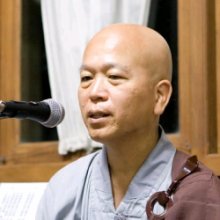
During the past few months, when meditating with closed eyes, I have developed a habit to open my eyes when images keep on appearing while putting an effort to focus on the method (body scanning/awareness or the breath). I feel that opening the eyes will effectively disperse away all the wandering thoughts, random memories or images.
In this retreat, Bro. Agus has also shared his point about the ‘rotten method’, i.e. a method that is not ‘fresh’ anymore, when we think that we are on the method but at the same time, thoughts, images are also playing in the background. This is often the case for me.
Therefore the approach when meditating with eyes slightly opened had offered me a fresh solution to my long-time problem. I decided to experiment with this new approach. I have been experimenting with this approach during the retreat and after the retreat and I now feel that this approach has helped me to improve the clarity of my attention.
I was curious also with the style of cushion used in the retreat, and amazingly It worked, at least in the beginning though. I was excited to find out that I didn’t have problem at all with pain. I thought I have found the magic cushion, but finally I was disappointed when this only lasted until Tuesday morning when finally the pain (buttock and back) came.
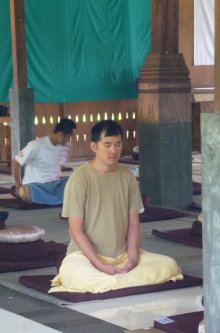
I realized that I could not run away from the pain. I just have to accept it. I have brought my own cushion, but I just decided just to continue with the existing cushion. Fortunately, the pain didn’t bother me much.
I felt quite happy that drowsiness didn’t bother me much. I remembered that it only attacked me on the first two sessions (morning session) of Tuesday day and first session of Wednesday. In the past, I always had drowsiness problem in the early morning session. I am happy that this has improved.
Another useful advice is about the full-scale massage. Massage (after sitting session) has been taught and part of the Chan retreat, however Guo Yuan Fashi’s instruction has aroused my strong interest on the massage when he taught the full scale massage again.
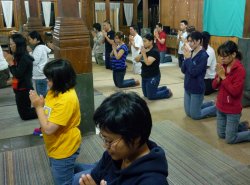
I thought that when we really do it wholeheartedly, it was really a good method of practice too because it helps to release the tension in the body and at the same time it actually bring our attention closely to the body-sensation again.
During the retreat, Guo Yuan Fashi had also given few dharma talks. In general his talk is simple but strikingly ‘direct’. However there are two talks that were deeply inspired me. The first was his advice to always take-up the beginners mind.
In fact this was his very first instruction in the retreat. It is true that when we attend to something that we are familiar with (our breath or method), we can easily loose our interest and then finally loosing our clarity and freshness. This point is a strong reminder for me because it is in resonance with the case of ‘rotten’ method.
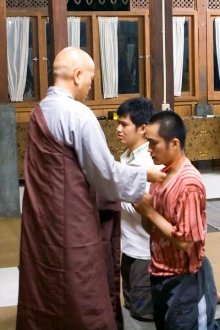
The second talk that deeply interests me was his final talk in the retreat. He spoke about impermanence, suffering, no self and emptiness. At first he elaborated about the reality of impermanence and suffering that can be easily understood through our logic. When we understand this, as a result, we should be able also to understand about no self and emptiness. However, he pointed out that intellectual understanding might not be the same as the understanding that comes from realization.
Guo Yuan Fashi specifically raised this question: ‘If we think we know that there is no 'self', then who is this that is eating, suffering, sitting and enjoying the meditation?’ He added that this is the most important inquiry that we should ask to ourselves.
The working of this contradiction sometimes bothers me and sometimes it is obviously painfull. While I know from reasoning that there is no ‘I’, why there is always this sense of ‘I’ everywhere I go and why there is this ‘I’ that feel

In his teaching, Master Sheng Yen has mentioned about the experience of forgetting the 'I', however unfortunately I have never experienced this. I have never forgot about this ‘I’ even during sitting meditation or during sleep. When I am putting attention on the method, in fact, I feel that the sense of ‘I’ (that is watching and aware) is even clearer, independent of wandering thought and the object of attention.
Again, Guo Yuan Fashi also asked a good question again: do we really want to find the answer? I do not know. Maybe I am not really interested. Maybe I am just willing to accept my ignorance. In the afternoon Bro. Agus led us to do the walking meditation and running meditation. He asked those important questions again. I felt that the retreat has just began but I also know the retreat has reached its end. I slowly dropped the question and just relax my body.
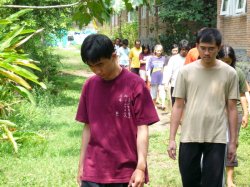
Finally the retreat ended happily. Interesting though, many non-Buddhists took up the three refuges. I think this is the only chan retreat that I know of that was attended by non-Buddhists who also took up the three refuges. I am happy that everybody is happy.
Watching the video about DDM has aroused again my deep admire and respect towards Master Shengyen. He has given living example that with method and vow, it is possible to walk in the selfless life of giving maximum services to all sentient beings.
(by Junarto )